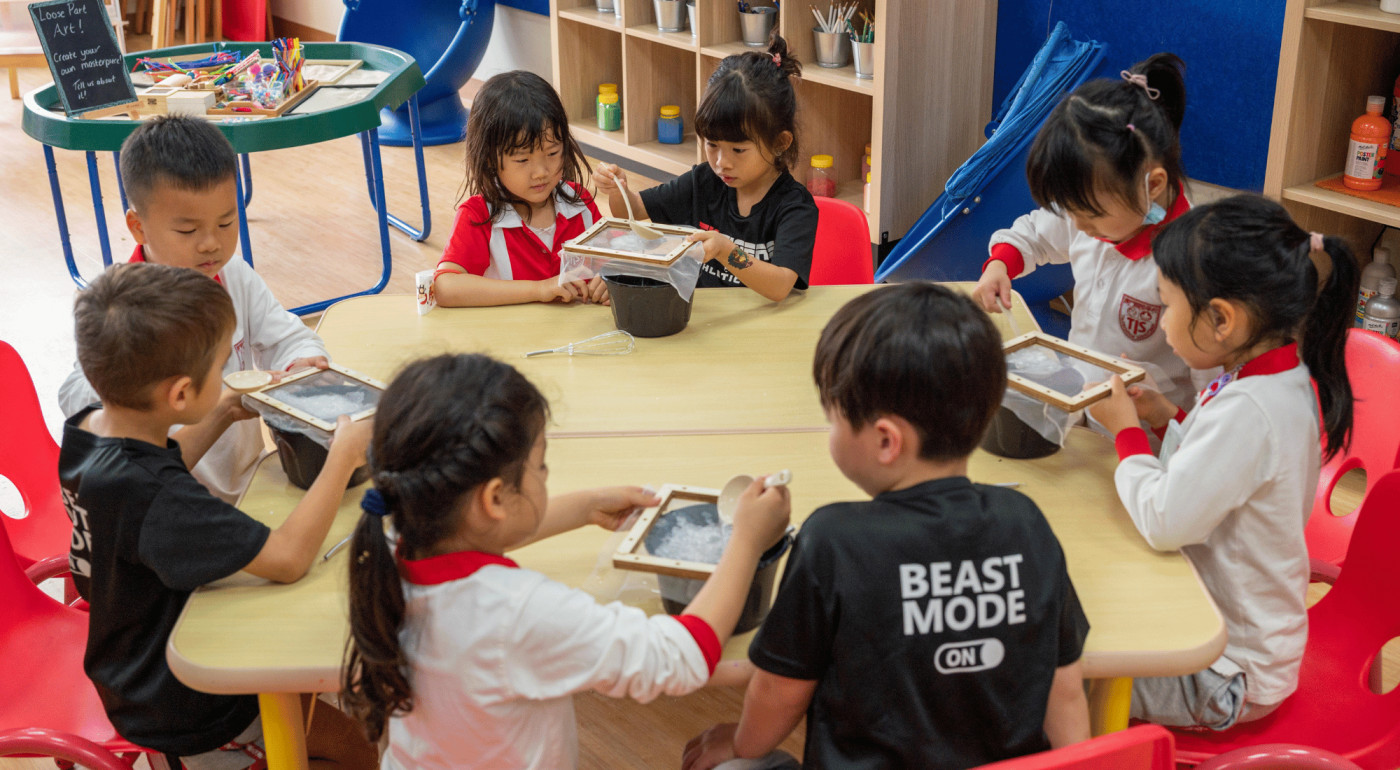
Cultivating Autonomy and Independence in Young Students
As children progress through kindergarten and elementary school, they encounter increasingly complex physical, social, emotional, and academic challenges. At TIS, our comprehensive three-year kindergarten program is designed to prepare children for these challenges by fostering their active participation in learning and enabling them to effectively handle the growing personal and academic demands they will face each year. Our approach focuses on promoting autonomy and independence during the early years, equipping children with the necessary skills and confidence to become successful, self-directed learners.
To accomplish this, we use a variety of strategies that encourage children to make their own decisions, take calculated risks, and independently solve problems. We firmly believe in the importance of self-advocacy and self-expression, and we prioritize the development of these qualities throughout our curriculum. By providing ample opportunities for kindergarten children to cultivate these skills, we ensure that they are well-prepared to navigate the challenges of elementary school and beyond.

Autonomy and independence are developed at home as well as at school. In what ways can you foster your child’s autonomy outside of school hours?
Encourage your child to independently complete tasks at their own pace. Although it may be tempting to assist them, it is crucial to provide them with the time and opportunity to learn and complete tasks on their own. If a task proves challenging, offer assistance by asking if they need help, but allow them to complete the final step. It can be beneficial to alternate between completing different steps together. Remember to provide encouragement and praise for their efforts, even if they are not yet fully independent. Many skills require constant practice to develop.
Physical autonomy is cultivated through play and movement, encompassing the development of both fine and gross motor skills as well as body awareness, balance, posture, and stamina. Encouraging your child to independently walk, climb stairs, engage with outdoor structures, manipulate small objects, self-feed, and carry out personal care activities with minimal assistance fosters the growth of physical autonomy and a robust, healthy body. Engaging in supervised risky play allows your child to take calculated risks, explore new experiences, and enhance their existing abilities. The achievement of new physical skills instills a sense of pride in children, and it is crucial to acknowledge and praise their efforts to inspire future endeavours.
Offer opportunities for developing responsibility by establishing consistent daily routines for your child. Such routines will help them understand the steps involved in completing tasks independently. Initially, demonstrate the procedure, then work beside them, and finally, provide gentle reminders as they carry out the task. Implementing routines can encompass activities such as teeth brushing, self-toileting, selecting clothes and getting dressed, preparing snacks, organizing school backpacks, reading together, and various other aspects of a child's day. Additionally, involving your child in tidying up their toys, caring for pets, and setting the table for meals allows them to contribute to family routines and fosters a sense of pride and achievement.

Assist your child in developing emotional management skills. Children who possess emotional autonomy are equipped with effective strategies and steps to navigate through intense emotions and regain control in an appropriate manner. At TIS, we implement the "Zones of Regulation" program to educate children on identifying their emotions, finding inner calmness, and restoring self-control. At home, you can adopt similar techniques by being present, assisting them in recognizing their emotions, empathizing with them, and having discussions once they have calmed down. Your child relies on you for support and guidance, observing how you manage your own emotions and how you react in times of stress. Appropriate responses to "Big Emotions" are cultivated through example, time, practice, and maturity.
Promote the development of independent decision-making skills. Offering choices to young children and allowing them to make their own decisions instills a sense of control and empowerment within them. Simple decisions such as selecting their outfit or deciding what to eat first provide them with a feeling of autonomy. However, it is important to offer a limited number of choices and consistently follow through with them. For instance, when it's time to prepare for bedtime, presenting options like "Would you like to brush your teeth, or read a story first?" conveys that going to bed is non-negotiable, but the order in which they complete their bedtime routine is up to them. This clear message effectively communicates what is open for discussion and what is not.

Allow your child to face the natural consequences of their actions and choices. This approach facilitates their comprehension of mistakes and reinforces the importance of assuming responsibility. Always rescuing your child and blaming others sends the message that they are exempt from personal accountability, resulting in their inclination to attribute blame to others and perceive themselves as victims of circumstances.
Promote the development of problem-solving skills and foster a growth mindset in your child. It is crucial to provide them with opportunities to tackle challenges, even if they experience unhappiness or failure. While they may not always make the correct choices, making mistakes builds resilience and competence, ultimately leading to improved skills through time and practice. Praise their efforts to solve problems. Discuss what they might try next time if their solution didn’t work this time. Mistakes are opportunities for growth. By assigning tasks that are slightly challenging but still within their reach (perhaps with some assistance), children will learn to handle frustration, solve problems, and empathize with others' perspectives.
Promote a sense of community pride and foster a global perspective. Aid your child in cultivating empathy towards others and fostering a sense of pride in their own family and community. Explore literature and films that offer diverse cultural viewpoints. Engage in volunteer activities, practice recycling, make charitable donations, and enjoy international travel experiences when possible. By exemplifying empathy and a global mindset, you will inspire your child to seek opportunities to contribute to and enhance their community. Exposure to diversity in their daily lives will enable children to develop a genuine appreciation for inclusivity.
Teachers who interact with children and help them build their autonomy during school hours, together with parents who work to influence their children's autonomy outside of school hours, are able to affect children’s overall happiness, independence, problem-solving skills, and school performance. The development of children's autonomy is a gradual process that requires patience, attention, modeling and support from the adults in their environment. As we create opportunities for questioning and exploring, encourage children to try new things, and provide engaging and enriching experiences, their capabilities and level of independence continues to grow. As a result, they are more able to tolerate frustration and are given opportunities to practice perseverance and responsibility, which improves their self-esteem in the long run.



